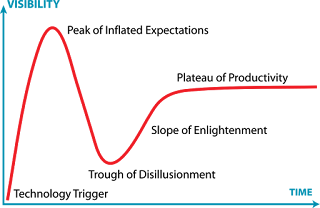 |
| Dr. Peter Doolittle |
While the content of the session, I believe, was quite familiar to a large part of the audience as it focused on Teaching, Learning, Technology, Memory and Research, the construction of the presentation kept us very engaged, with some pretty amazing aha and wow moments when he asked us to participate to illustrate different types of memory.
He carefully chunked his content, marking each transition with a humorous related video. One of them was this video about Math:
https://www.youtube.com/watch?v=M2_kQ1Bf1js. I wish I could find a better version of it, but do take the time to watch it and be puzzled. He carefully repeated content to deepen our memory, and he made the connections between our activities and why they related to the content very obvious.
The talk's message was essentially that because of the way our brain works, we need to construct our learning activities carefully to allow all learners to be successful, and the tools to do this are backward design, careful choice of tools, and constant remembering why we are doing what we are doing so that students can process new knowledge and skills repeatedly.
Sounds simple enough, and we think we are all doing this already, but his examples drove a couple of points home that I think we tend to neglect when we teach.
1. We construct knowledge out of materials provided -- but that construction is not the same for everyone.
2. Because of this construction, meaning is remembered but specifics get lost - so we need to be obvious with our students what specifics we want them to know
3. To test learning, ask students to say what they know (not write what they know)
4. Learning happens when we practice retrieval in varied ways with different purposes (so no memorization), at the principle level, with us having the sense that we have some control and autonomy, supported by developmental feedback and connected to our prior knowledge and experiences.
That brings a lot of challenges to our classrooms - connect to this the fact that our Working Memory can really only hold 3-4 concepts (and by concepts I mean words) for a couple of minutes, we can see how our students are struggling when we ask them to work with lots of new content in a short amount of time. One suggestion was to hand out complex content ahead of time so that students do not need to take notes and thus not pay attention. Segment the information and take short breaks every 5 minutes for 30 seconds for students to catch their brain breath.
Studies have shown that when you scaffold content, the students with a lower cognitive load ability will be able to perform as well as the students with high cognitive load ability -- this, I think, is huge, as it means that we can give all students an even better equitable opportunity at success.
He reminded us that motivation can be fostered through: Choice, Caring, Challenge, Collaboration, Competence and Curiosity (I am missing on C) -- consider how you are doing this with your classes.
How does technology fit into all of this -- well, as part of the design of the class, the different tools can help students achieve success, and he reminded us that we need to be way more intentional and collaborative about researching emerging technologies so that we can start later in the Hype Cycle (Gartner)
 |
| Hype Cycle |
His repeated challenge to us was that we need to consider each presentation for this conference under the light of Where is the processing? Where is the design? Where is the research?
I thought giving us this kind of focus for the entire conference was very useful and is something to do for our own sessions and conferences.
No comments:
Post a Comment